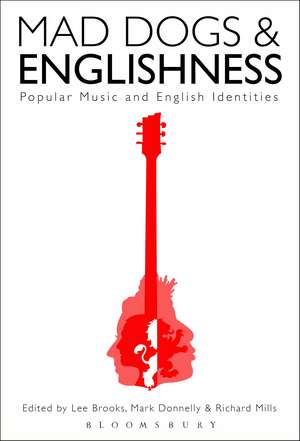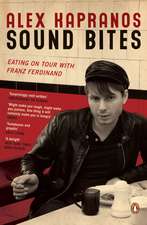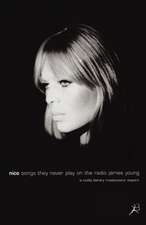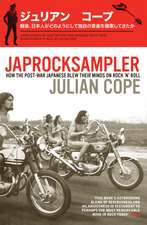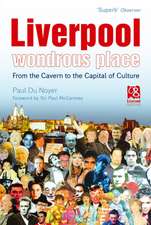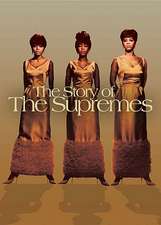Mad Dogs and Englishness: Popular Music and English Identities
Editat de Lee Brooks, Mark Donnelly, Dr Richard Millsen Limba Engleză Paperback – 17 apr 2019
| Toate formatele și edițiile | Preț | Express |
|---|---|---|
| Paperback (1) | 230.43 lei 43-57 zile | |
| Bloomsbury Publishing – 17 apr 2019 | 230.43 lei 43-57 zile | |
| Hardback (1) | 773.06 lei 43-57 zile | |
| Bloomsbury Publishing – 18 oct 2017 | 773.06 lei 43-57 zile |
Preț: 230.43 lei
Preț vechi: 296.90 lei
-22% Nou
Puncte Express: 346
Preț estimativ în valută:
44.09€ • 46.15$ • 36.70£
44.09€ • 46.15$ • 36.70£
Carte tipărită la comandă
Livrare economică 31 martie-14 aprilie
Preluare comenzi: 021 569.72.76
Specificații
ISBN-13: 9781501352027
ISBN-10: 1501352024
Pagini: 240
Dimensiuni: 152 x 229 x 16 mm
Greutate: 0.33 kg
Editura: Bloomsbury Publishing
Colecția Bloomsbury Academic
Locul publicării:New York, United States
ISBN-10: 1501352024
Pagini: 240
Dimensiuni: 152 x 229 x 16 mm
Greutate: 0.33 kg
Editura: Bloomsbury Publishing
Colecția Bloomsbury Academic
Locul publicării:New York, United States
Caracteristici
Fourteen essays cover a wide range of musical genres, artists and ideas, and contributors collectively employ a matching breadth of critical and disciplinary approaches across the book
Notă biografică
Lee Brooks, Mark Donnelly and Richard Mills work in the School of Arts and Humanities at St Mary's University, Twickenham, UK. They have extensive experience of teaching courses on popular music cultures. They have also published on subjects such as Sixties Britain, The Beatles and Morrissey.
Cuprins
Foreword Rupa Huq (Kingston University, UK)AcknowledgementsIntroduction: Englishness, whose Englishness? Lee Brooks and Mark Donnelly (St Mary's University, Twickenham, London, UK) Part One: English Heritage1. 'Rosy, Won't You Please Come Home': Family, Home, and Cultural Identity in the Music of Ray Davies and the Kinks. Carey Fleiner (University of Winchester, UK)2. 'Rule Britannia is out of bounds': David Bowie and English Heritage.David Bowie Is . (2013) The Next Day (2013) and Blackstar (2016) Richard Mills (St Mary's University, Twickenham, London, UK)3. Mod Cons: Back to the Future with The Jam (1977-79) Ben Winsworth (University of Orleans, France)4. PJ Harvey and Remembering England Abigail Gardner (University of Gloucestershire, UK) Part Two: Spaces of Identity5. An adventure in English Space and Time: Sound as Experience in Doctor Who (An Unearthly Child) Dene October (University of Arts, London, UK)6. Productive boredom and unproductive labour: Cabaret Voltaire in the People's Republic of South Yorkshire Jon Hackett (St Mary's University, Twickenham, London, UK)7. Flag of Convenience? The Union Jack as a contested symbol of Englishness in popular music or a convenient marketing device? Johnny Hopkins (Brighton Institute of Modern Music, UK) Part Three: Performing Discrepancy8. The Poison in the Human Machine Raphael Costambeys-Kempczynski (Université Sorbonne Nouvelle, Paris)9. 'Brand New You're Retro': Tricky as Engpop Dissident Christian Lloyd and Shara Rambarran (Brighton Institute of Modern Music, UK)10. The (un)masked bard: Burial's denied profile and the memory of English underground music Gabriele Marino (University of Turin, Italy)11. Albion Voice: The Englishness of Bishi Simon Keegan-Phipps and Trish Winter (University of Sheffield, UK and University of Sunderland, UK) Index
Recenzii
With Brexit looming, and ongoing questions of 'Britishness' and 'Englishness' in relation to borders, immigration, migrant workers and national independence within the United Kingdom being asked, this book couldn't be more timely.
There's an old, oft-used, truism that the arts help us make sense of the world in which we live. Never has the world needed such conduits to comprehension as we do today, as we grapple with the seemingly unthinkable reality of the post-Brexit United Kingdom standing separate from Europe, and the juggernaut that is the United States of America lying in the unpredictable hands of Donald Trump, a "surely it couldn't happen" president. Within the arts, popular music functions as both a contemporaneous mirror to the society in which it was spawned and a potent agent for enlightenment, protest, and change. In Mad Dogs and Englishness an admirably broad and talented team of international scholars unpicks the cultural and political implications of being English, as represented through the always exciting lens of popular music. The "problem" of being English is tackled head-on in this watershed volume that ranges admirably free of disciplinary fences.
There's an old, oft-used, truism that the arts help us make sense of the world in which we live. Never has the world needed such conduits to comprehension as we do today, as we grapple with the seemingly unthinkable reality of the post-Brexit United Kingdom standing separate from Europe, and the juggernaut that is the United States of America lying in the unpredictable hands of Donald Trump, a "surely it couldn't happen" president. Within the arts, popular music functions as both a contemporaneous mirror to the society in which it was spawned and a potent agent for enlightenment, protest, and change. In Mad Dogs and Englishness an admirably broad and talented team of international scholars unpicks the cultural and political implications of being English, as represented through the always exciting lens of popular music. The "problem" of being English is tackled head-on in this watershed volume that ranges admirably free of disciplinary fences.
